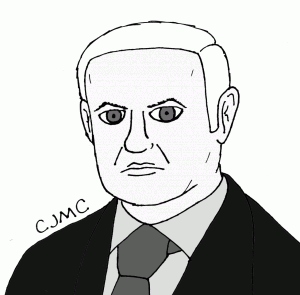The newest season of “House of Cards” revolved around an American attempt to broker peace between Israel and Palestine. It is fitting, then, that Israeli Prime Minister Benjamin Netanyahu won a surprise reelection with antics so shameless that Frank Underwood would blush while breaking the fourth wall.
One day before last week’s election, Netanyahu shocked the world by declaring unambiguously that there would never be a Palestinian state on his watch. The day of the vote, he rallied his voters with good old-fashioned race-baiting, warning that Arab voters were coming to the polls “in droves.” (As a matter of fact, Israel’s Arab parties did have a historically good showing, having finally decided to run with, instead of against, each other.)
Two days after the election, Netanyahu backtracked. He claimed to have never revoked his support for a demilitarized Palestinian state and that he only meant that conditions were not yet right for an agreement. (He also gave a mediocre apology for his racial comments, which was then rejected by the Arab Joint List.)
According to one narrative, this was a disaster for liberal Zionism and a potential turning point in Israel’s already perilous international relations. UN watchers know that Israel is the General Assembly’s favorite human-rights punching bag. Israel makes a convenient scapegoat for the world’s dictators and genocidal regimes, many of which are anti-Western, and many of whom have seats on the UN Human Rights Council in a given year. (Notoriously, Libya was a member until the 2011 uprising. Current members include Russia, Pakistan, Cuba and Saudi Arabia, which has been reappointed almost continuously since 2007. Sudan was nominated and nearly appointed nine years into the Darfur genocide.) Yet, the Israeli occupation is just bad enough to put Israel in the sights of legitimate human rights advocates and to make defending Israel an unpopular proposition outside of American domestic politics. Israel is also subject to disproportionate attention because larger human rights abuses usually involve countries that are unstable or autocratic and thus presumably less susceptible to pressure.
International recognition of Palestine and pressure on Israel has grown during Netanyahu’s administration, held at bay only by the United States’ Security Council veto, which, in turn, is based on the premise that Israel supports a two-state solution and that unilateral actions at the UN reward Palestine for failing to come to the negotiating table. (This premise is not as absurd as it sounds; several years ago, president of the Palestinian Authority Mahmoud Abbas was the one obstructing peace negotiations, even after Netanyahu spent political capital negotiating a settlement freeze and other unrequited concessions.) Now that Palestine has been recognized by the International Criminal Court, the stakes are higher than ever. Netanyahu’s election antics played with fire. And Israel may still get burned, as President Obama has personally stated he does not believe Netanyahu’s retraction.
However, it is important not to mischaracterize the elections. Netanyahu personally won, but he did so by poaching seats from parties even farther to the right than his own. Moreover, the net size of the Israeli right actually shrank from 61 to 57 seats out of 120. This comes despite the fact that the center-left was plagued by uninspired leadership. Having failed to build a successful peace platform, it tried to run an economic campaign. Netanyahu connected better with Israel’s Jewish minorities who resent the Ashkenazi elite. Eventually, though, his luck might run out.
Thus, if this election represents a turning point, it will come from the United States’ reaction to Israel, not from the Israeli electorate itself. On the one hand, it is in America’s interest to push Israel and the Palestinians toward peace, and this is one area where moral and strategic logic coincide. America’s UN veto and $3 billion in annual aid entitle Obama to meddle in Israeli politics, as George H.W. Bush did when Prime Minister Yitzhak Shamir refused to freeze settlement construction. (Israel needed loans to absorb a wave of immigrants from the USSR’s decomposing corpse; Papa Bush suspended these loans; voters nixed Shamir.) Unfortunately for Obama, there is no way Congress will let him near the purse strings.
On the other hand, anything as drastic as a complete about-face at the UN would trigger a backlash and vindicate Netanyahu’s own warnings to voters. According to the Israeli right, Jews have been on their own for 3,000 years, and international condemnation is inevitable regardless of what Israel does. So, the best response is to hold firm. President Obama is less popular in Israel than any other American president and must make Netanyahu look unambiguously responsible for any diplomatic spat. (Fortunately, Netanyahu’s Congressional speech stunt helps Obama’s case.) Moreover, substantive actions taken at the UN would be impossible to reverse. Obama told Netanyahu he needs to “re-assess our options” and refused to rule out supporting full UN recognition of Palestine. Unfortunately, the traditional argument against this is still valid: the Palestinian Authority is equally guilty in obstructing peace negotiations. Recognition would reward Abbas, giving him less reason to take the risks associated with peace. It is self-defeating to apply pressure to one side in ways that take pressure off of the other side. A better alternative would be to back a UN resolution establishing a timeline for the establishment of a demilitarized Palestinian state. Such proposals have been tabled by France and other nations. If Palestine backed out, the US could give Israel cover to back out. If Israel doesn’t follow through, the US could support harsher measures.
The Obama Doctrine is, in the President’s own words, “don’t do stupid stuff.” Hopefully, he will live by that wisdom while revisiting US policy.
Taylor is a member of the class of 2015.





